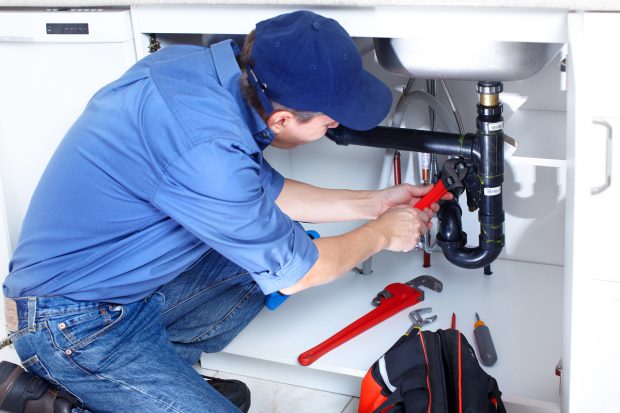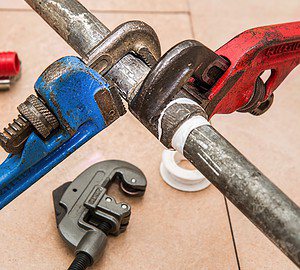One of the most common and dreaded house repairs is plumbing. It often goes overlooked and ignored until it’s too late. When your pipes burst, the cost of repair can be out of your budget, and the damage done to your home could be irreversible. If you take these steps to prevent a plumbing disaster this summer, you’ll have nothing to worry about.

Summer is the best time of year for seasonal yard work. It’s also the best time to check your plumbing for any problems. Homeowners can get serious headaches from a clogged sink or toilet, and a major plumbing system failure can be financially devastating. By taking a little time during summer to check and repair your plumbing, you’ll have fewer problems over the long term, and they’ll be much easier to fix when they occur. Here are some tips to help you keep your plumbing running smoothly, safely, and efficiently all summer long.
1. Flush it Out
According to Dustin Corey from Danika Plumbing LLC, it’s important to remove all the sediment from your plumbing system, especially from older homes. This is when most older systems begin to show cracks and seepage. Remove the sediment in your sewer line for the same reason. This can be done with a pipe snake and an auger if you have cracks, or by flushing water through the pipes.
When you flush your sewer drain your system can work more efficiently and save you a lot of money in repairs when you have a clogged drain. If any problems occur this summer, such as dripping toilets or running faucets look for leaks as the cause, then replace all washers before they fail. Fixing small plumbing problems now will prevent bigger problems later.
2. Don’t ignore odors
If there’s a foul odor coming from your plumbing system, then you know something is wrong. The smell may come and go or be constant, and it may be a mildew odor or a more pungent smell of rotten eggs. If the odor is coming from your toilet, then there may be a problem with the drain trap. If you don’t want to plunge it yourself, call an expert plumber to check it out.
Ryan Tierney from C.D. Roofing & Construction Ltd. says vent pipes can also cause an odor to seep into the house. The vent pipes are the pipes that you see sticking out from the roof to release air pressure, allowing water to flow freely. They also emit odors from the sewer line. Cleaning debris away and out of the vent pipes can extend the life of your plumbing and help to avoid costly repair.
3. Check the Pressure
Check your plumbing pressure to make sure it’s not too high. The pressure gauge will usually be found at the water meter or near the water meter on a house with a private well. Pressure above 80 psi starts to create problems, cause leaks, and can damage some appliances, like dishwashers and washing machines, so it is important to keep the pressure within the recommended range of 40-55 psi. If you have copper pipes you may want to check for leaks using a special leak detector fluid.
4. When to Replace Pipes
The American Society of Civil Engineers recommends replacing copper or galvanized water pipes every 25 years or sooner. You can determine when to replace copper pipes by testing for lead and copper, since the older a pipe is, the more likely it is to contain lead.
A homeowner can tell if their pipes are nearing the end of their useful life by checking the outside of the pipe. If it is corroded, then it should be replaced before water begins to leak. If you have cast iron pipes or galvanized steel pipes that are more than 30 years old, they should also be replaced. Be sure to go through your plumbing checklist when you’re on the market for a new home.
5. Repairs
Even if you’ve been careful, you can still make mistakes when you’re fixing a plumbing issue. The symptoms of a plumbing problem often make it seem like the problem is more severe than it is. For example, if your water pressure is suddenly too low, there might not be much wrong with your system.
Some low water pressure could be caused by a water line that is frozen or clogged somewhere else in your house. To eliminate the possibility of having a larger problem, always check your water pressure after it has been warm for several hours. Water pressure drops fast at first, so you should wait a while before you take action.
Leaks are more difficult to fix than most people think because the water that leaks out of the pipe can’t be seen or measured with a regular tester. To find a leak, first, turn off the water, then turn on all the faucets at the same time. If any leaks are found and repaired immediately, most of the water will be wasted in that short period.
6. Use Caution
Most people think that if there’s a leak, it has to be repaired immediately. The truth is you can live with some minor plumbing issues, like a slowly dripping shower faucet or sink. You don’t have to fix every problem right away, especially if it isn’t causing damage to your home or making the problem worse. If you’re getting ready to move to a smaller home, decluttering may take priority over fixing a faucet that drips once every hour. This is also a reason why you should have your plumbing inspected before buying a home!
If you have a problem that won’t get worse over time, such as dripping drains or toilets, then you can wait until you find the time and money to fix them. If you’re not sure whether your situation is severe or not, call a qualified plumber to help you figure out what needs to be done.
7. Leak Inspection
Leak detection is vital to maintaining a home. Pipes are continuously expanding and contracting due to temperature changes. That expansion and contraction cause leaks in many areas that you may not even know exist, such as around toilets, shower heads, spigots, and faucets. When you notice your water bill suddenly increases, it may be time to look for leaks in your plumbing lines. Other signs of possible leaks are puddles on the floor of your basement or the area under the sinks
To find a leak, first, turn off the water and make sure all fixtures are shut off. Also, inspect all faucets (hose lines or electrical) for leaks. If you find one, stay calm. It takes emotionally healthy skills to be under stress and act rationally-even when facing a potentially large repair invoice.
If you have a plumber visit you, he or she can check for leaks with a special leak detector. He will listen for the hissing noise of leaking water and test your entire plumbing system to see if there are any potential leaks.
Final thoughts…
A well-maintained plumbing system is essential to a sunny and safe summer. Whenever you have these little plumbing problems, remember that they can easily become a big problem if left unresolved. Never assume that all is well. If you do have a problem, take care of it or you can end up spending more money and time to fix it later on. To have a safe and trouble-free plumbing system, follow these summer plumbing tips to keep your home in good working order.



